The existence of magic in a story offers so many possibilities for how characters might overcome obstacles, relate to one another, manipulate the fabric of their worlds, and express who they truly are. But magic has to have limits, too, or any story whose protagonist comes to possess it would end in that instant, with an effortless and consequence-free fix of all their problems. Magic can be difficult to acquire, challenging to master, or simply limited in what it can do. But I’m drawn to stories in which the hardest thing about magic is the price you have to pay for it—whether that price was chosen freely, stumbled into accidentally, or inflicted against your will.
My latest book, The Rightful Queen, focuses on a rare breed of magic-users exempt from the physical pain most mages experience. But in return, these individuals suffer psychic fractures that limit and manipulate their spectrum of emotions, perennially opening deep mental wounds.
Even with abilities we can only dream of, human beings are still plagued by so many familiar, inescapable things, weighted down even when they can conquer gravity. Power is most fascinating when it also makes you vulnerable. Here are five books (or the first book in a series, when the whole series is applicable) in which the price of magic is particularly ingenious:
Manifestation of a weakness: The Circle by Sara B. Elfgren and Mats Strandberg
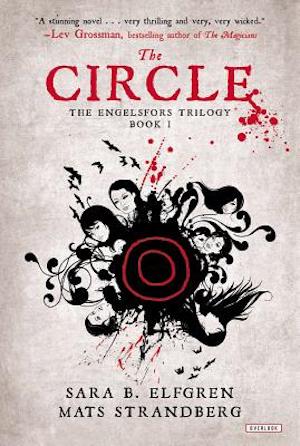
In this first book of the excellent Engelsfors trilogy, six teenage girls who previously knew nothing about magic’s existence must contend with sudden powers they can’t control. Each character’s magic develops differently—and, for most of the girls, in the direction they least would have wished for. Confident, outgoing Vanessa finds herself ignored and isolated whenever her invisibility flares up, while shy Rebecka’s flashy pyro- and telekinesis push her toward a leadership role. Mean girl Ida, who has relentlessly bullied others for anything “weird,” is appalled by the dramatic horror-movie shenanigans that are part of being a spirit medium, and Linnéa, an outcast who does her best to wall herself off from everyone around her, is literally forced to empathize with others when she can’t get their thoughts out of her head. In order not to be left at the mercy of their own powers, the girls have to navigate the kinds of situations they’ve always tried to avoid before, and question how they’d truly like to live.
Physical/psychological trauma: Two Serpents Rise by Max Gladstone
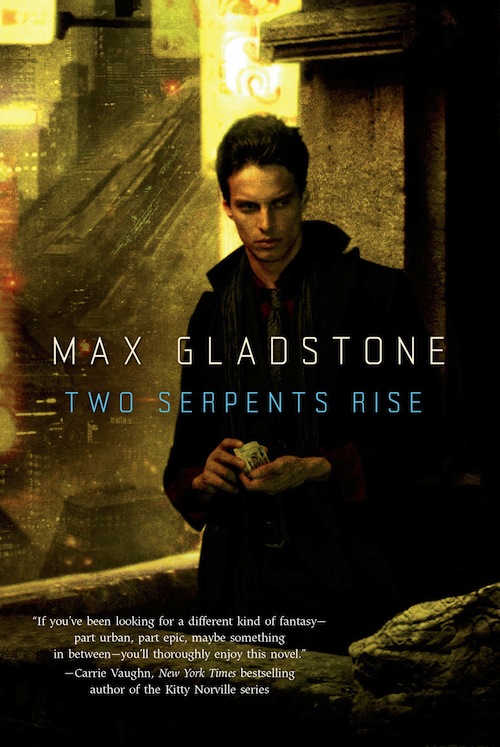
Caleb, the protagonist of Two Serpents Rise, has the very rare ability to unravel the spells of the series’ primary magic-users. This ability comes from a long-overthrown priesthood, and it was bestowed on him by his father, Temoc, one of the last living priests. However, a recipient of this power must suffer wounds ritually carved all over their bodies. When Caleb was still a child, Temoc drugged him and performed this ritual without his consent, an act that put Caleb in the hospital and tore apart his family when his mother couldn’t forgive his father for what he had done. Caleb’s scars are literally the source of his power, and as his adult self grows ever closer to all-out conflict with Temoc, those scars are a constant reminder of his father’s hopes for his future, a dream that Caleb cannot fulfill.
Loss of self: The Wind Singer by William Nicholson
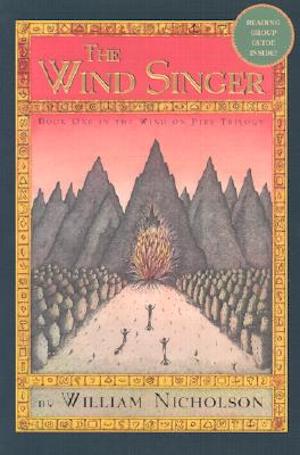
Magic as a corrupting force is a fairly common trope in fantasy stories, but the big bad of the Wind on Fire series haunted my childhood nightmares for a different reason. The Morah, a sort of magical hivemind, was once a bolstering, benevolent force present in all living beings, but over-reliance on its power caused it to turn violent and hungry. Bowman, one of the series’ twin protagonists, is a magical prodigy who can tap into the Morah to bolster his own gifts, even though he aspires to eventually destroy it. But in order to use the Morah’s power, he must subsume himself into its will: an insatiable drive for destruction and conquest, devoid of empathy or individuality. The decision to surrender your individual consciousness and will, even temporarily, is as chilling to me now as it was when I first read the series.
Existential despair: Suikoden III: The Successor Of Fate by Aki Shimizu
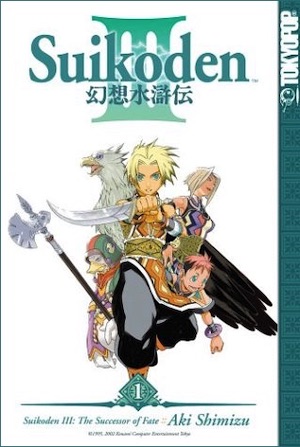
In the world of Suikoden, magic comes from runes, sigils that can be attached to living hosts. Many minor runes are mass-produced and can be placed and removed at will, but the most powerful runes are unique and choose their own bearers. The more a rune has to offer its bearer, the more likely it is to come with some sort of terrible downside: the deaths of those closest to you, a craving for human blood, a slow descent into madness. The runes that take center stage in Suikoden III seem idyllic at first: they each bestow control over a specific element, as well as immunity from aging or natural death. But they also bear haunting visions of an “ashen future,” devoid of life, change, or freedom, that the collective will of the most powerful runes seems to be steering humanity toward. Would eternal life still seem like a blessing if you knew you would survive just to witness the end of everything?
Outsider status: Every Heart A Doorway by Seanan McGuire
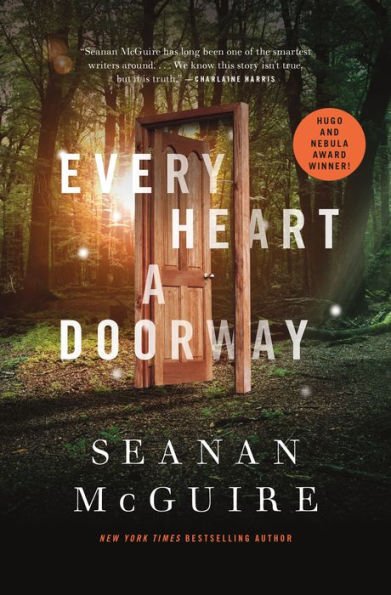
I’m not always a fan of the trope of magical beings as targets of persecution; handled poorly, it can seem like a case of being hated because you’re too special. But the painful feelings of not belonging the protagonists of Every Heart experience are less the result of other people’s words or actions than a truth they feel in their bones. They are children who have unwillingly returned to our world after having experienced at least one other—worlds filled with magic, yes, but also worlds in which they felt they could truly be themselves. Whether every otherworld was actually beneficial for every character is certainly debatable, but the characters wanted to remain in the worlds that chose them—and, the longer they did, the less suited for existence in this world they became. If they refuse to disavow the places they still wish to call home, they must remain estranged from their families, their former lives, and even this world itself.
Isabelle Steiger was born in the city and grew up in the woods. She received her first notebook when she was eight, and she’s been filling them up ever since. She lives in New York, though her erstwhile companion, a very moody gray cat, has since retired and moved to Florida.










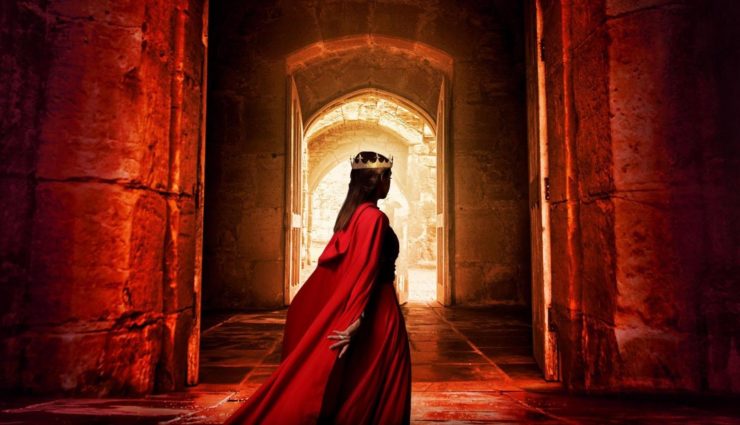
Nice surprise to see Suikoden in this list :)
Someone help me out. I’m drawing a blank, but somewhere in my library is a book that I never finished where magic comes at the cost of a random person’s lifeforce. The more magic that is used, the quicker that random person’s (who the wizard doesn’t know and will probably never meet) life is drained.
@2 I don’t know a book, but that was the cost of bringing someone back from the dead for longer than five minutes in PUSHING DAISIES. (Great show. I recommend it highly.)
There’s a fantasy series I’ve not read where you have to trade intelligence for magic. The idea of doing that is so horrifying to me I run screaming in the opposite direction from the book. (The older you get, the more precious memory and intelligence is, kids.) If I can remember its name, I’ll repost.
I used to teach world-building and magic systems, and I totally agree that magic must have a cost, or the book stinks.
@3 The Magister Trilogy CS Friedman which is an extended look at ideas raised in her Coldfire Trilogy.
ETA: A similar cost is in the Gossamer Mage by Julie E. Czerneda.
I am put in mind of the “sources” from Guy Kay’s The Fionavar Tapestry.
@5 – Thanks! Coldfire was another series I couldn’t finish. Just didn’t grab me.
In joy Chant’s Red Moon, Black Moon all magic comes with a price. The price of earth magic is blood. As in blood sacrifice. The price of Star Magic is human pleasures. One is never cold or hungry which is good. But one also never feels warm and cozy or enjoys eating.
I immediately thought of the Thomas Covenant books when I read this (although I always struggled with the idea that he was a whiny little prick, and thus a very unsympathetic protagonist, once you got to book two).
Magic fucks you up in the Shanara books, as I recall.
In Weis & Hickman’s Fire Sea, using necromancy to raise the dead causes someone living to die.
In The Golden Voyage of Sinbad, the sorcerer Koura grows older/more enfeebled with each spell he casts.
In Doctor Strange comics, casting spells always has a price–usually in the form of the wizard being injured/becoming nauseous.
In The Dragon Waiting by John M. Ford, the young boy at the beginning of the novel looses one of his eyes as the price of magic.
@12- Puts one in mind of Odin, in Norse Mythology, who in seeking out various sources of knowledge and wisdom underwent a number of ordeals- including the sacrifice of an eye.
Starting with book three of The Death Gate Cycle (by Dragonlance writers Margaret Weis and Tracy Hickman), Fire Sea, the series deals extensively with this. Without going into spoiler territory, it has massive & horrifying implications for the messed-up state that the setting is currently in.
The Rivers of London novel series by Ben Aaronovitch magic instantly destroys chips in nearby electronics (for example cell phones.) Also overuse can cause the wizard to suffer cumulative brain damage leading to dementia.
magic has very distinct Earth-ending costs in the Charles Stross “Laundry” books and in Ian Tregillis “Milkweed Triptich”
I recall The Runelords being pretty brutal about this. You’re not the one paying the price, it’s your neighbour you swipe the skill from. So as one of the citizens of this fine realms, either you’re a sacrificial lamb for your hero or the villain helped themselves. Either way, you’re miserable.
FINALLY, someone else read William Nicholson’s trilogy!!!
And, THANK YOU for mentioning a video game on this list!!!
In Mercedes Lackey’s ‘Heralds of Valdemar’ series, magic / mind magic causes problems when you’re not trained properly, have too many gifts, have a near-uncontrollable gift that’s nevertheless seen by others as a great weapon.
In Julian May’s Exiles / Galactic Milieu series where telepaths start being born after WWII, they realise they can’t marry non-telepaths.
The Laundry Archives by Charlie Stross. Every time you do magic in your head (in contrast to doing the necessary calculations with a computer for example) tiny feeders from another dimension have the chance to eat part of your brain. So, long-time magic users normally look like Creutzfeldt–Jakob sufferers. Brrr!
Fletcher Pratt The Blue Star has a frame suggesting there must be a price for magic or Darwinian evolution would quickly have left only magic users in the population.
In Gwyneth Jones’s Bold as Love series, using functional magic causes forest-fire pattern brain damage. And risks the integrity of reality if you take it too far, of course.
Wait, no mention of WoT in the comments? (Yes, I’m a Black Tower fangirl.)
We want [need] more bridge playing protagonists.
Keep shuffling those cards Caleb!
Someone needs to pry the Suikoden series out of Konami’s cold dead hands.
The Last Herald-Mage Trilogy by Mercedes Lackey is the first thing I can remember reading that dealt with this issue, the mind, body, and soul costs of magic, and did so much for the genre in my mind.
This list has some things on it I haven’t read, so thanks for the recommendations!
Light Bringer by Brent Weeks comes to mind those with magical drafting abilities live shorter lives the more magic they use the shorter their lives become.
Brandon Sanderson, to perform magic, one has to be broken in some manor, to allow the investiture (magic) into your soul. In mistborn, that means beating your kid until they snap and gain their ability.
Going way back, there was Moorcock’s Elric series. The cost of wielding Stormbringer was very high. In manga and anime, the concept of equivalent exchange dominated Full Metal Alchemist.
For folks interested, I would recommend Kat Howard’s An Unkindness of Magicians. Magic saps physical resources, but the physical cost can be delegated, and a system of privileged magicians gets built at the expense of the less fortunate. And, of course, someone has to come along to disrupt the oligarchy.
All I can in my head is Rumplestiltskin saying “magic always come with a price, dearie” in tv show Once Upon a Time. usually a bargain of some sort or if Dark magic then a sacrifice/death is required.
I have found magic usually at least comes at the price of strength or power of the user. Otherwise we’d just have magicians dominating all fantasy fights. Even in Harry Potter you can that force of will and strength play a part in sustaining magic (ie: Harry vs. Voldemort final fight).
In R.L. King’s Alasdair Stone series, a mage’s magic is fueled with their own internal source of magic and its usage is based on discipline, learning use patterns for spells, etc. This can be quite draining for a mage, depending on the level of the spell and amount of internal “fuel” it takes to power it. On the other hand, a black mage will, much like an energy vampire, use up the life source of those around them, even going so far as to drain a person to ash to fuel a spell.
@27 Heck, what about the Black Ka’kari in Night Angel?
As many others, I’m happy to see Suikoden on the list. Luc’s story, through both the first two games and into the third, especially with the expansion to it in the manga, is very tragic, and when one looks deeper into the lore surrounding Hiikusaak, it gets even worse…
The price in Ryk E. Spoor’s “Princess Holy Aura” was the protagonist literally losing his identity and who he was to save the world. (No real spoilers there, it’s in the blurb.)
Also a book that has a grown man turn into a teenage girl and yet never gets creepy about it. That’s some tightrope walking there.
@28 That was changed by Harmony though we haven’t seen the new method on the page.
In Unkindness of Magicians and Witchmark, when magic comes at no cost to users, it hides the suffering of those actually paying the price, whether the magicians are aware of that or not. The whole point for the heroes becomes to overthrow the status quo and upend the comfort of the privileged.
The Allie Beckstrom series by Devon Monk and in full agreement with An Unkindness of Magicians by Kat Howard.
The magical investiture from Sanderson’s Warbreaker came from taking the “breath” of another person. Each person is born with one “breath” that could be given away. The person drained was mostly fine, but some of their vibrancy was gone. That breath added to your own as one big breath, giving you more abilities like perfect pitch, being able to see more of the color spectrum, and being able to bring objects to “life.” The loss of that huge breath could have profound effects on the former owner.
Vita Nostra, the Dyachenkos. In the process of learning who you are, you lose who you are. The methodology isn’t presented as “magic” per se, but rather as the mastery of language acts.
Holly Black’s Curse Workers series is a given on this list.
@11 Rickarddavid – Ah, “The Golden Voyage of Sinbad” – I saw that in the theater when I was a kid. Man how I loved it.
I love how this is used in Anne Bishop’s The Others series. Blood prophets (Cassandra Sangue) can tell the future – but only when they are cut deeply enough to scar. And every addictive cut brings them closer to the 1000th cut that will kill them.
Diane Duane’s “Tale of the Five”/”Middle Kingdom” books have two types of magic, both with costs: Sorcery and the Fire. Both seem to use up your life force.
The effect we SEE for sorcerers is a draining of physical energy and a backlash that can knock them out for hours or days.
But the Fire . . . well, there are no old practitioners with this rare gift. It may drain you short-term, but long term, it drains days, weeks, months, years off your life.
In Andre Norton’s classic Witchworld series, the price of magic is human love & marriage. It seems that a lot of fantasy writers play with the idea that magic exacts the price of human connection, from Norton’s books to Le Guin’s Ged in Earthsea, to Joy Chant’s Star Magicians and well into the current crop of writers in the genre. It makes one speculate about how the idea of a magician as one set apart and who must give up something vital to wield magic came about.
@44 I think that was just the Witches, tho – those in the Dales (Keovan’s land) seemed to have far more ability to love.
In the Great Library books by Rachel Caine, Morgan’s powers can drain the lifeforce of a whole city’s crops (which does not make anyone there happy with her), the lifeforce of small animals, and people around her if she *really* goes all out. She discovers that she needs to be really, really careful with this. It’s not called magic, but it pretty much is.